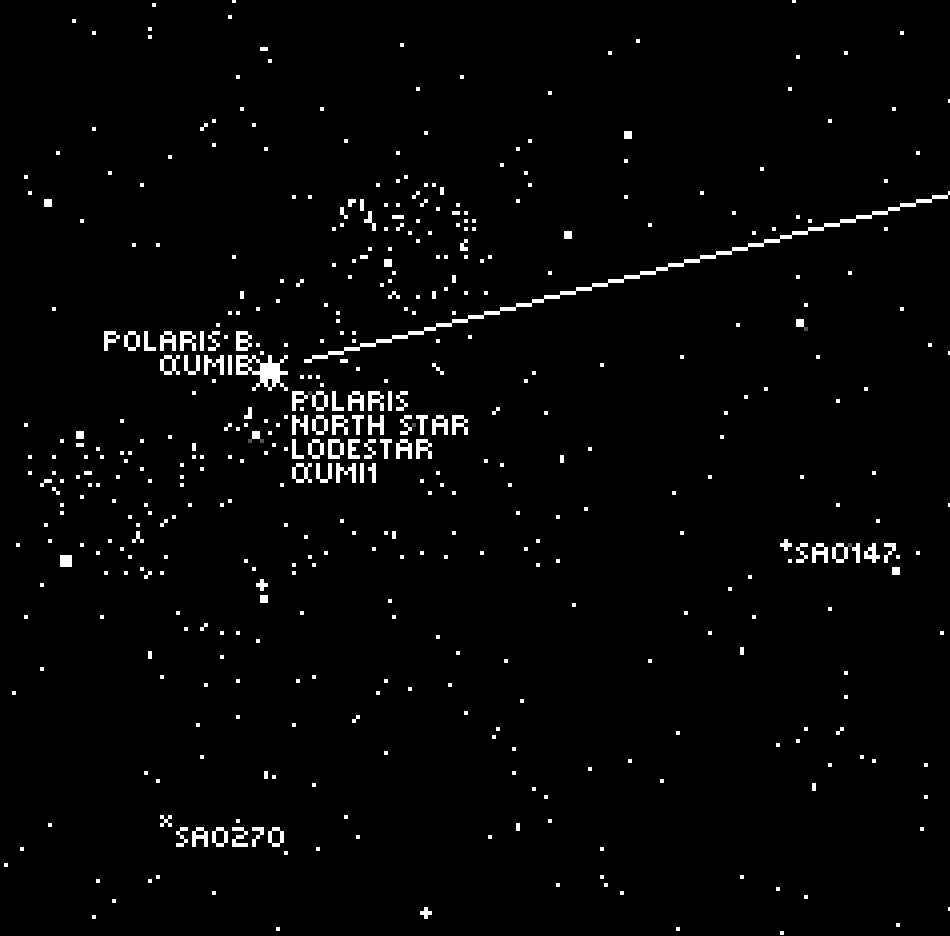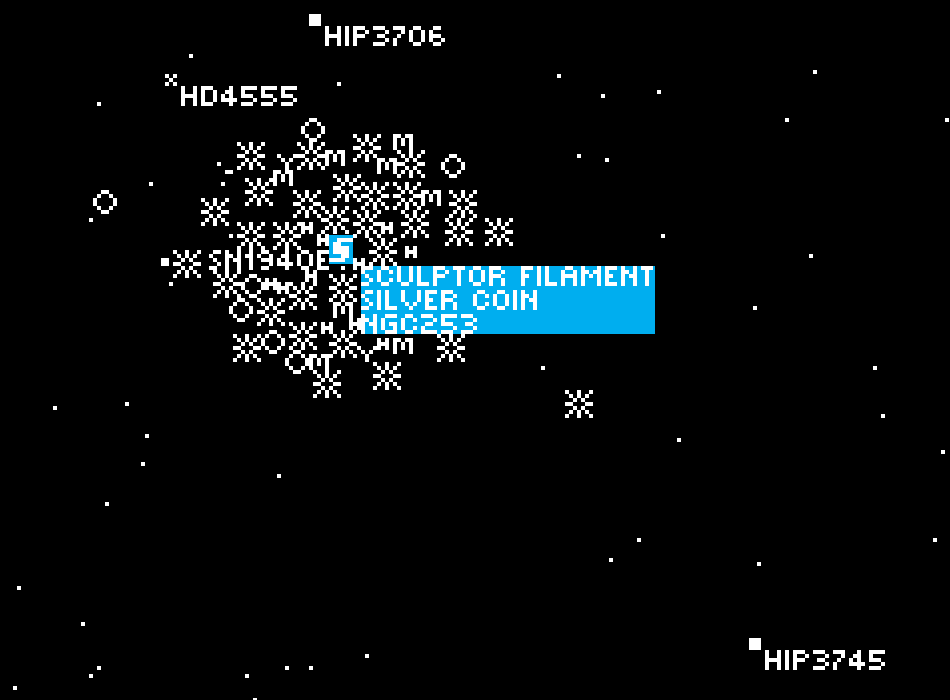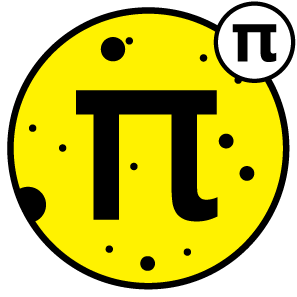space + pixels
nobody to see
like geese about the sky
The Sky, northern hemisphere
The mysterious and incomplete sky is yours in these 100 megapixel and 10 gigapixel maps of the northern celestrial hemisphere.
Included are about 2.4 million stars from the major catalogues (HR, Hipparcos and Tycho-2). In the 10 gigapixel image, the entire 100+ million star UCAC4 catalogue is included. Canonical IAU constellation asterisms are included. About 100,000 deep sky objects are also shown. These are jittered to avoid overlap, which is why some clusters of objects appear as large globules of symbols.
In the 10 gigapixel map, labels are lovingly placed and formatted to include name, catalogue and magnitude data. The 100 megapixel map has no labels.
Stellar and deepsky object annotations taken from Vizier.

The northern and southern hemisphere maps sample from the following lists
313 canonical star names approved by the IAU (2017-11-19)
4,009 NASA exoplanet archive exoplanets (4 July 2019)
162,252 deep-sky objects (not stars or solar system objects)
2,508,427 stars from Yale Bright Star (HR), Hipparcos-2 HIP and Tycho-2 catalgoues
111,235,172 stars from USNO CCD Astrograph Catalog (v4) (UCAC4) catalogue (down to magnitude 16.593)
The maps are shown in azimuthal projection and comprise two layers. The top layer contains stars at magnitude < 13 (these are shown with shapes larger than a single pixel), deep-sky objects and exoplanets. All objects on this layer have a 1-pixel black stroke to make them stand out from the layer below, which contains stars at magnitude ≥ 13 (shown as single pixels).
Star shapes are not jittered. Deep-sky object shapes are jittered to avoid overlap with adjacent shapes. All deep-sky objects are drawn by priority (e.g. those that have labels are drawn first and then by magnitude) and if a location could not be found within a fixed distance of its position then the shape is not drawn. This is why the number of objects on the map is lower (161,952) than in the list (162,252).
To maximize room for objects, the 100 megapixel maps are without labels and do not show stars with magnitude > 13. The 10 gigapixel have labels generated by sketchy heuristics (read below) and include all stars.
northern hemisphere
74,121 deep-sky objects (13,426 with labels)
3,059 exoplanets (all labeled)
1,274,250 stars (mag < 13) (231,048 with labels)
43,008,972 stars (mag ≥ 13)
southern hemisphere
87,831 deep-sky objects (9,120 with labels)
950 exoplanets (all labeled)
1,489,112 stars (mag < 13) (332,973 with labels)
67,971,985 stars (mag ≥ 13)
stars
labels
Labels for stars include the IAU name, other common names and constellation membership (Greek and numerical index). If these fields are not available, then the star's catalogue entry (e.g. HR, HIP, HD, PPM, SAO, Renson (REN), ADS) is shown. Tycho-2 and UCAC4 names are not shown.

Below are some examples of different label formats for stars.
# ; indicates a line break Alpheratz;Sirrah;αAnd21 Dubhe;αUMa50 La Superba HD343127/45 RST 5162/AB BRT 2512/AB COU 1209/AB STF 1929/AB ADS15211 AB HIP116228 ιCas Peg2
magnitude distribution
Shape of distribution shows sqrt-transformed values.
-1.0000> 2 0.000
-1.0000 0.0000 3 0.000 0.000
0.0000 1.0000 12 0.000 0.000
1.0000 2.0000 34 0.000 0.000
2.0000 3.0000 131 0.000 0.000
3.0000 4.0000 357 0.000 0.000
4.0000 5.0000 1124 0.000 0.000
5.0000 6.0000 3471 0.000 0.000
6.0000 7.0000 10415 0.000 0.000
7.0000 8.0000 29444 0.000 0.000 *
8.0000 9.0000 83296 0.001 0.001 **
9.0000 10.0000 222021 0.002 0.003 ***
10.0000 11.0000 604511 0.005 0.008 ******
11.0000 12.0000 1756153 0.015 0.024 **********
12.0000 13.0000 4081779 0.036 0.060 ***************
13.0000 14.0000 8954480 0.079 0.139 ***********************
14.0000 15.0000 19658992 0.173 0.312 ***********************************
15.0000 16.0000 40078420 0.353 0.665 **************************************************
16.0000 17.0000 38096284 0.335 1.000 ************************************************
17.0000 18.0000 31 0.000 1.000
18.0000 19.0000 17 0.000 1.000
19.0000 20.0000 9 0.000 1.000
20.0000 21.0000 5 0.000 1.000
21.0000 22.0000 2 0.000 1.000
22.0000 23.0000 3 0.000 1.000
23.0000 24.0000 2 0.000 1.000
24.0000 25.0000 2 0.000 1.000
24.8500< 0 0.000
n 113581000
average 15.25766
min -1.46000
max 24.85000
Here is a sample SIMBAD TAP query that lists all stars in HR, HIP and TYC catalogues as well as stars that have names.
select oid,ra,dec,allfluxes.v,otype_txt,otypedef.otype_longname,ids.ids
from basic
join ids on ids.oidref = oid
join ident on ident.oidref = oid
join otypedef on otypedef.otype = basic.otype
join allfluxes on allfluxes.oidref = oid
WHERE
ident.id like 'TYC %' or
ident.id like 'HIP %' or
ident.id like 'HR %' or
(ident.id like 'NAME %' and
otype_txt not in ('SBG','SFR','As*','Cl*','C?*') and
(otypedef.otype_longname like '%star%' or otypedef.otype_longname like '%Star%')
)
deep-sky objects
labels
Determining the label of an object is done by a series of heuristics. Some labels span more than one line. Labels are jittered to avoid overlap with shapes, where possible.
There is no single right way to label an object, though there are some ways that are more wrong than others. An object can have a large number of identifiers and cobbling a name from these is a fun exercise. For example, consider the magnitude 13.87 Syefert Galaxy known as the Sculptor Filament. This object has the following identifiers.
1ES=0045-25.5 1FGL=J0047.3-2512 1Jy=0045-25|0045-255 1RXS=J004733.3-251722 2E=184|0045.1-2533 2FGL=J0047.0-2516 2MASX=J00473313-2517196 3FGL=J0047.5-2516 6dFGS=gJ004733.1-251719 AGC=20535 AT20G=J004733-251717 Cul=0045-255|0045-25 DUGRS=474-001 ESO=474-29 ESO-LV=474-0290 GLXY=G095.1-88.0+344 HIPASS=J0047-25
INTREF=36 IRAS=00450-2533|F00450-2533 LEDA=2789 MCG=-04-03-009 MRC=0045-255 MSH=00-2-22 NAME=Silver Coin|Sculptor Filament|Scl Filament NGC=253 NVSS=J004733-251717 OHIO=B -275 PKS=0045-25|J0047-2517|0045-255 PMN=J0047-2517 PSCz=Q00450-2533 RAFGL=5038 RBS=112 RX=J004731-25175|J0047.5-2517 SGC=004507-2533.9
SINGG=HIPASS J0047-25 TeV=J0047-253 UGCA=13 VLSS=J0047.5-2517 WISH=B0045.1-2533 WMAP=62|J0047-2515|J0047-2514|J0047-2513|J0047-2516 [CAB95]=IRAS F00450-2533 [CHM2007]=LDC 26 J004733.13-2517196 [DML87]=570 [M98c]=004505.7-253340 [NKB95]=N0253 [VV2000c]=J004733.2-251717 [VV2003c]=J004733.2-251717 [VV2006c]=J004733.2-251717 [VV2010c]=J004733.2-251717 [VV98c]=J004733.2-251717
Many of the fields can be excluded immediately, such as the [publication reference] ones. Catalogue fields like NAME, M, NGC, IC, LEDA, MLB, NOVA, LSQ, SN, V*, BCLMP are used, taking care of cases where NAME repeats values from other catalogues.
The map shows it as
Sculptor Filament Silver Coin NGC253

Here are some examples of different label formats for deep-sky objects.
# ; indicates a line break Northern Hubble Deep Field;Hubble Deep Field North Serpens Triple Radio Source;Serpens SMM1;SH268FIR1 Question Mark Galaxy;Whirlpool Galaxy;M51 Filamentary Nebula;Cirrus Nebula;NGC6960 Solovyov's Object;NOVAAql 1949 SER MOL CLOUD CORE SN MRK297A;SN1982aa Cetus Polar Stream Maia Nebula;NGC1432 NOVAAur 1891/2 4.1 UGC4904V1;SN2006jc AT2017gay;V*PT And Watson X1;V*MT Com SH26235IR Cluster Nova2006no8in M31 FAUST V023;NGC4276 Giant Void in NGH NOVAUMi 1956 bn100516014 MLB4-9/3-79 Origem Loop 2Mon Region Patchick DC NGC6633 4.6 LEDA2113175 M85OT20061 Orion East V*V572 And Teutsch GN IC131West DR21(OH)W Cirrus H1 LDN1551II IC4414/B V*SW UMa SN1990ag LSQ13zm SN2015O NGC937 NGC358 IC1434 M78 IC7
magnitude distribution
Shape of distribution shows sqrt-transformed values.
0.0000> 2 0.000
0.0000 1.0000 0 0.000 0.000
1.0000 2.0000 2 0.000 0.000 **
2.0000 3.0000 9 0.001 0.001 ****
3.0000 4.0000 11 0.001 0.002 ****
4.0000 5.0000 32 0.003 0.005 ********
5.0000 6.0000 54 0.005 0.010 **********
6.0000 7.0000 98 0.009 0.020 **************
7.0000 8.0000 150 0.014 0.034 *****************
8.0000 9.0000 196 0.019 0.052 ********************
9.0000 10.0000 228 0.022 0.074 *********************
10.0000 11.0000 360 0.034 0.108 ***************************
11.0000 12.0000 557 0.053 0.161 **********************************
12.0000 13.0000 667 0.063 0.224 *************************************
13.0000 14.0000 751 0.071 0.296 ***************************************
14.0000 15.0000 612 0.058 0.354 ***********************************
15.0000 16.0000 565 0.054 0.407 **********************************
16.0000 17.0000 861 0.082 0.489 ******************************************
17.0000 18.0000 1196 0.113 0.602 **************************************************
18.0000 19.0000 1070 0.102 0.704 ***********************************************
19.0000 20.0000 658 0.062 0.766 *************************************
20.0000 21.0000 557 0.053 0.819 **********************************
21.0000 22.0000 612 0.058 0.877 ***********************************
22.0000 23.0000 473 0.045 0.922 *******************************
23.0000 24.0000 295 0.028 0.950 ************************
24.0000 25.0000 269 0.026 0.976 ***********************
25.0000 26.0000 149 0.014 0.990 *****************
26.0000 27.0000 61 0.006 0.996 ***********
27.0000 28.0000 47 0.004 1.000 *********
28.1600< 0 0.000
n 10544
average 16.61758
min -4.00000
max 28.16000
I have selected a representative fraction of known deep-sky objects based on their type and name status. Below is the list of the number of objects of each SIMBAD classification. Because deep-sky objects
1 * Hot subdwarf
1 BLL BL Lac - type object
1 ClG Cluster of Galaxies
1 EB? Eclipsing Binary Candidate
1 FIR Far-IR source (\lambda >= 30 {\mu}m)
1 G? Possible Galaxy
1 HH Herbig-Haro Object
1 HI HI (21cm) source
1 WD* White Dwarf
1 WD? White Dwarf Candidate
1 XB? X-ray binary Candidate
1 ev transient event
1 sh HI shell
2 *iC Hot subdwarf
2 C?* Possible (open) star cluster
2 HXB High Mass X-ray Binary
2 MGr Moving Group
2 Pl Extra-solar Confirmed Planet
2 SFR Star forming region
2 XB* X-ray Binary
3 GrG Group of Galaxies
3 Rad Radio-source
4 Psr Pulsar
4 grv Gravitational Source
5 LP? Long Period Variable candidate
5 X X-ray source
5 mul Composite object
6 QSO Quasar
7 RS* Variable of RS CVn type
9 BNe Bright Nebula
9 GNe Galactic Nebula
9 cC* Classical Cepheid (delta Cep type)
10 BH? Black Hole Candidate
10 PoG Part of a Galaxy
10 Q? Possible Quasar
12 EmO Emission Object
13 UV UV-emission source
14 Bla Blazar
14 bCG Blue compact Galaxy
15 St* Stellar Stream
17 BY* Variable of BY Dra type
18 WU* Eclipsing binary of W UMa type (contact binary)
18 bL* Eclipsing binary of beta Lyr type (semi-detached)
20 rB radio Burst
35 SyG Seyfert Galaxy
37 EB* Eclipsing binary
39 PaG Pair of Galaxies
43 As* Association of Stars
43 IR Infra-Red source
45 ISM Interstellar matter
46 RNe Reflection Nebula
48 Y*? Young Stellar Object Candidate
59 CGb Cometary Globule
60 Al* Eclipsing binary of Algol type (detached)
61 LI? Possible gravitationally lensed image
74 No? Nova Candidate
80 LS? Possible gravitational lens System
100 Sy1 Seyfert 1 Galaxy
121 LeQ Gravitationally Lensed Image of a Quasar
126 PN Planetary Nebula
127 Le? Possible gravitational lens
136 GlC Globular Cluster
143 BiC Brightest galaxy in a Cluster (BCG)
154 LSB Low Surface Brightness Galaxy
191 glb Globule (low-mass dark cloud)
219 AGN Active Galaxy Nucleus
252 out Outflow
269 rG Radio Galaxy
299 Cl* Cluster of Stars
311 Sy2 Seyfert 2 Galaxy
361 SB* Spectroscopic binary
372 Y*O Young Stellar Object
395 GiC Galaxy in Cluster of Galaxies
397 reg Region defined in the sky
409 IG Interacting Galaxies
471 of? Outflow candidate
494 OpC Open (galactic) Cluster
512 vid Underdense region of the Universe
523 gLS Gravitational Lens System (lens+images)
535 gLe Gravitational Lens
565 GiP Galaxy in Pair of Galaxies
590 EmG Emission-line galaxy
776 SBG Starburst Galaxy
780 DN* Dwarf Nova
806 LIN LINER-type Active Galaxy Nucleus
842 SR? SuperNova Remnant Candidate
979 LeG Gravitationally Lensed Image of a Galaxy
1,079 LeI Gravitationally Lensed Image
1,080 H2G HII Galaxy
1,492 SNR SuperNova Remnant
1,850 No* Nova
1,963 Cld Cloud
2,634 G Galaxy
3,144 GiG Galaxy in Group of Galaxies
3,149 SN? SuperNova Candidate
3,347 PoC Part of Cloud
3,389 Mas Maser
5,193 bub Bubble
5,457 HVC High-velocity Cloud
7,206 cor Dense core
7,717 MoC Molecular Cloud
8,175 gB gamma-ray Burst
11,165 SN* SuperNova
22,513 ? Object of unknown nature
27,800 DNe Dark Cloud (nebula)
30,707 HII HII (ionized) region
------
162,252 deep sky objects
Here is a sample SIMBAD TAP query that lists all Messier objects.
select oid,ra,dec,allfluxes.v,sp_type,morph_type,otypedef.otype_shortname,otypedef.otype_longname,ids.ids from basic join ids on ids.oidref = oid join ident on ident.oidref = oid join otypedef on otypedef.otype = basic.otype join allfluxes on allfluxes.oidref = oid WHERE ident.id like 'M %'
All deep-sky objects. This query selects all objects that are not stars.
select oid,ra,dec,allfluxes.v,sp_type,morph_type,otypedef.otype_shortname,otypedef.otype_longname,ids.ids
from basic
join ids on ids.oidref = oid
join ident on ident.oidref = oid
join otypedef on otypedef.otype = basic.otype
join allfluxes on allfluxes.oidref = oid
WHERE
otypedef.otype_shortname in ('SBG','SFR','As*','Cl*','C?*') or
(otypedef.otype_longname not like '%star%' and otypedef.otype_longname not like '%Star%')
